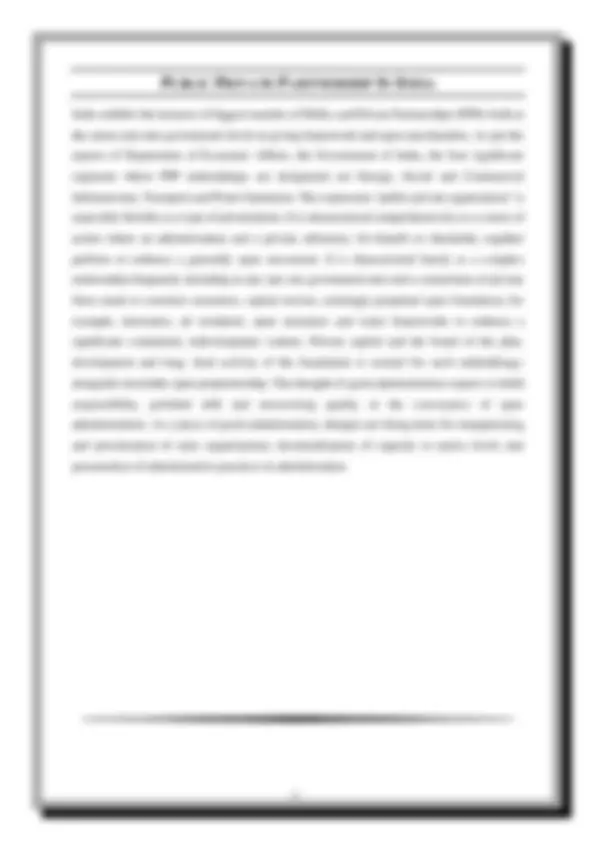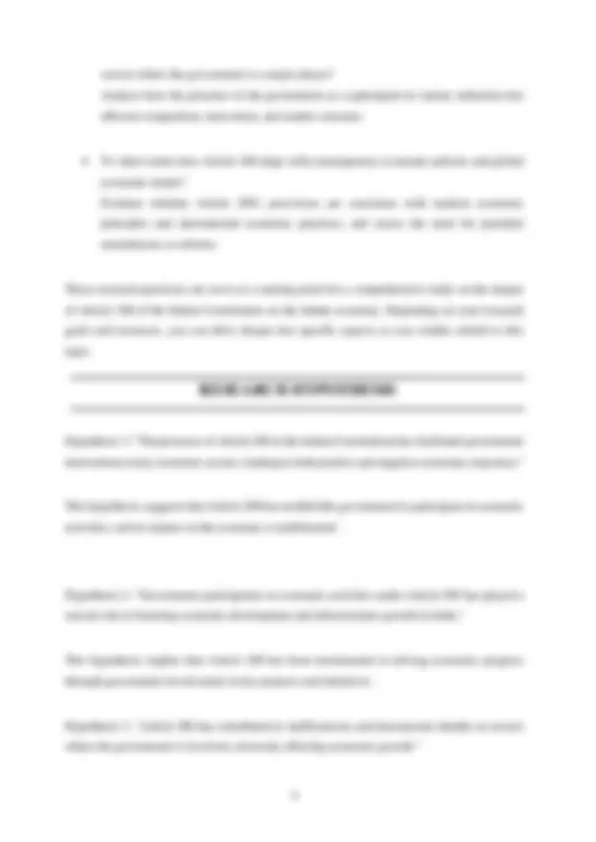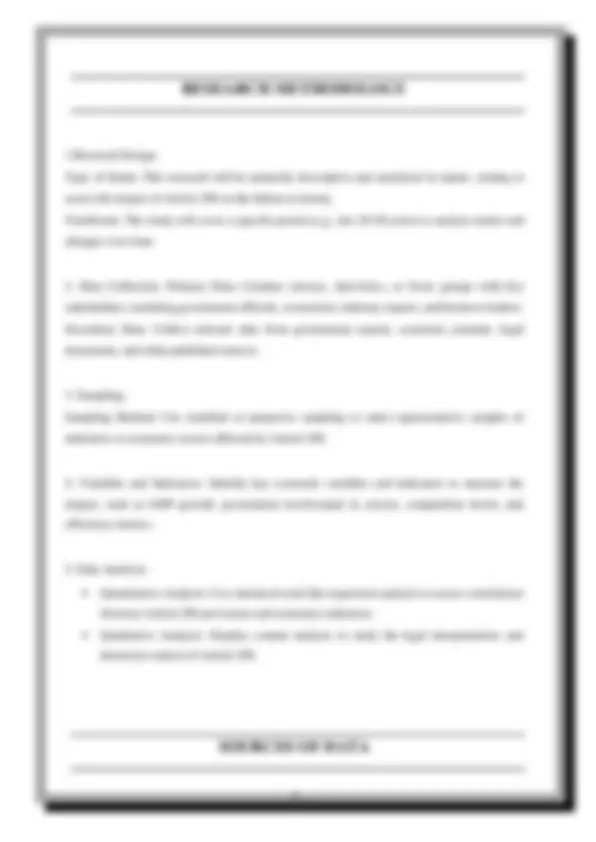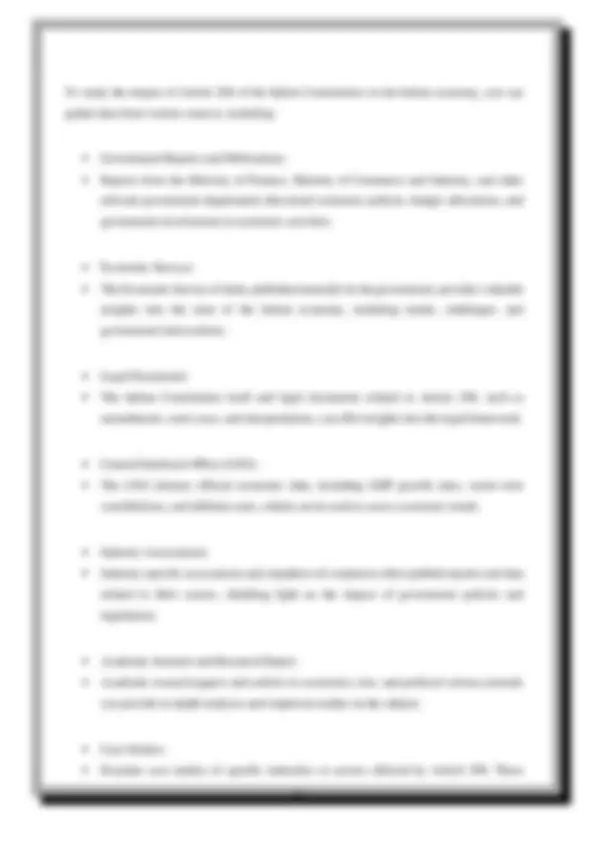








Study with the several resources on Docsity

Earn points by helping other students or get them with a premium plan


Prepare for your exams
Study with the several resources on Docsity

Earn points to download
Earn points by helping other students or get them with a premium plan
Community
Ask the community for help and clear up your study doubts
Discover the best universities in your country according to Docsity users
Free resources
Download our free guides on studying techniques, anxiety management strategies, and thesis advice from Docsity tutors
Article 298 of the Indian Constitution grants the government the power to engage in trade, business, and economic activities. This study examines the historical evolution, impact, and alignment of this provision with contemporary economic policies and global trends. The research combines primary data from stakeholder surveys and interviews, and secondary data from government reports, economic journals, and legal documents. The analysis employs quantitative and qualitative methods to assess the multifaceted impact of Article 298 on the Indian economy, providing insights to inform policy decisions regarding its interpretation and potential reforms.
Typology: Thesis
1 / 12

This page cannot be seen from the preview
Don't miss anything!







Projects are a very important part of a student’s life in a law school. Projects help us explore the topics and on the topics which we don’t generally get to work on in our normal study process. Therefore, I am very thankful to my economics lecturer Ms. Isha Wadhwa Mam , for giving me the topic of “ Impact of Art.298 of Indian Constitution on the Indian Economy”. By this topic I was able not only in exploring the economic topic but also the legal topic along with it.
Indian Constitution is the source of all laws, powers and authority that is conferred upon the legislature, executive and judiciary. All the activities that is carried by the state is provided authority by the means of the constitution. Similarly, the state or the government draws the power to carry on economic activities from the constitution only. The power to make contracts on behalf of the state is also authorized by the constitution. Art. 298 of the Constitution authorizes the Government to carry on trade. Art.298 says that-
298. Power to carry on trade, etc- “The executive power of the Union and of each State shall extend to the carrying on of any trade or business and to the acquisition, holding and disposal of property and the making of contracts for any purpose: Provided that- (a) the said executive power of the Union shall, in so far as such trade or business or such purpose is not one with respect to which Parliament may make laws, be subject in each State to legislation by the State; and (b) the said executive power of each State shall, in so far as such trade or business or such purpose is not one with respect to which the State Legislature may make laws, be subject to legislation by Parliament.” By the virtue of this article only the concept of ‘Public Private Partnership’ arose in India. The Government of India defines a Public Private Partnership as: “ Public Private Partnership (PPP) Project means a project based on a contract or concession agreement, between a Government or statutory entity on the one side and a private sector company on the other side, for delivering an infrastructure service on payment of user charges .”^1
India exhibits the instance of biggest number of Public and Private Partnerships (PPPs) both at the union and state government levels in giving framework and open merchandise. As per the reports of Department of Economic Affairs, the Government of India, the four significant segments where PPP undertakings are designated are Energy, Social and Commercial Infrastructure, Transport and Water Sanitation. The expression "public private organization" is especially flexible as a type of privatization. It is characterized comprehensively as a course of action where an administration and a private substance, for-benefit or charitable, together perform or embrace a generally open movement. It is characterized barely as a complex relationship frequently including at any rate one government unit and a consortium of private firms made to construct enormous, capital serious, seemingly perpetual open foundation, for example, interstates, air terminals, open structures and water frameworks to embrace a significant community redevelopment venture. Private capital and the board of the plan, development and long- haul activity of the foundation is normal for such undertakings, alongside inevitable open proprietorship. The thought of good administration expects to build responsibility, polished skill and unwavering quality in the conveyance of open administrations. As a piece of good administration, changes are being done for reengineering and privatization of state organizations, decentralization of capacity to native levels and presentation of administrative practices in administration.
administration conveyance. o PPP plays a significant instrument for making business openings by building up the administrations area. o PPP moves the hazard to private segment which can diminish the potential for government cost invades from unexpected conditions during task improvement or on the other hand administration conveyance. According to the agreements the administrations are given at a predictable.
Article 298 deals with the right of the government to carry on trade, business, and other activities. Here are five research questions you can explore:
sectors where the government is a major player? Analyze how the presence of the government as a participant in various industries has affected competition, innovation, and market structure.
Hypothesis 1: "The presence of Article 298 in the Indian Constitution has facilitated government intervention in key economic sectors, leading to both positive and negative economic outcomes." This hypothesis suggests that Article 298 has enabled the government to participate in economic activities, and its impact on the economy is multifaceted. Hypothesis 2: "Government participation in economic activities under Article 298 has played a crucial role in fostering economic development and infrastructure growth in India." This hypothesis implies that Article 298 has been instrumental in driving economic progress through government involvement in key projects and initiatives. Hypothesis 3: "Article 298 has contributed to inefficiencies and bureaucratic hurdles in sectors where the government is involved, adversely affecting economic growth."
To study the impact of Article 298 of the Indian Constitution on the Indian economy, you can gather data from various sources, including:
might be available in academic journals, industry publications, or research reports.